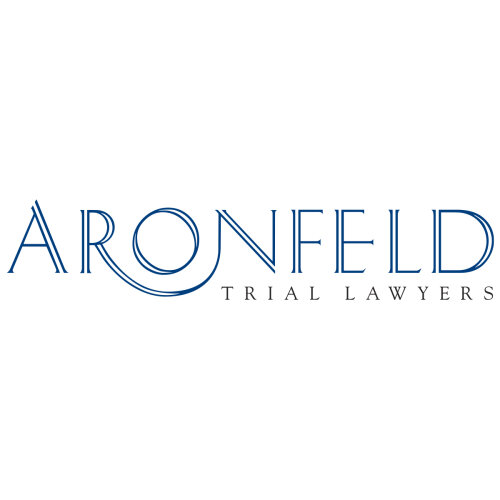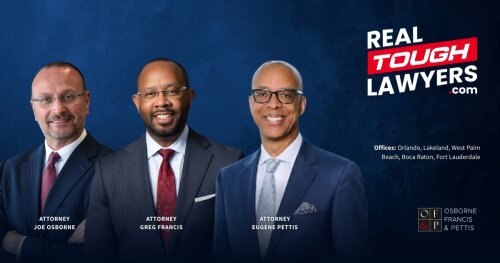Best Native People Lawyers in Florida
Share your needs with us, get contacted by law firms.
Free. Takes 2 min.
Or refine your search by selecting a city:
List of the best lawyers in Florida, United States
About Native People Law in Florida, United States
Florida is home to several Native American tribes, with the Seminole and Miccosukee Tribes being the most recognized. The legal landscape for Native People in Florida is shaped by a combination of federal, state, and tribal laws. These laws cover issues such as tribal sovereignty, land rights, federal recognition, gaming and economic development, cultural preservation, and social services. The relationship between Native People and the government is unique, with tribes recognized as sovereign nations that have the right to self-govern within the borders of the United States.
Why You May Need a Lawyer
There are several common situations where individuals may require legal assistance related to Native People in Florida:
- Land and property disputes, including land claims or issues involving tribal trust lands
- Matters related to tribal membership and enrollment
- Understanding and exercising rights under federal recognition and tribal sovereignty
- Disputes over business dealings or contracts on tribal lands
- Intellectual property matters involving traditional knowledge or cultural heritage
- Civil or criminal jurisdiction questions when offenses or disputes involve tribal members or tribal land
- Issues involving Indian Child Welfare Act (ICWA) protections in family law cases
- Education, healthcare, or housing rights for Native People
- Challenges involving government benefits or interactions with government agencies
- Representation in complex inter-governmental negotiations or disputes
Local Laws Overview
In Florida, Native People are primarily governed by a combination of federal statutes, including the Indian Civil Rights Act, Indian Gaming Regulatory Act, and Indian Self-Determination Act, as well as treaties and statutes specific to each tribe. State laws also apply in certain contexts, but jurisdiction can be limited by federal preemption or tribal sovereignty.
Tribal governments operate as independent entities with varying structures and laws. For example, the Seminole Tribe of Florida and the Miccosukee Tribe of Indians of Florida each have their own constitutions, courts, and police. Agreements between tribes and the state impact areas such as gaming operations, law enforcement cooperation, and education.
Florida law recognizes the unique status of federally recognized tribes and allows for collaboration in areas like child welfare under the Indian Child Welfare Act. However, non-federally recognized tribes may have different or limited legal protections.
Frequently Asked Questions
Who are the main Native American tribes in Florida?
The Seminole Tribe of Florida and the Miccosukee Tribe of Indians of Florida are the two federally recognized tribes. There are also other groups and descendants of tribes historically present in the region.
What does it mean for a tribe to have federal recognition?
Federal recognition acknowledges a tribe’s status as a sovereign nation, grants eligibility for federal programs, and provides certain protections and rights under federal law.
Can state laws apply on tribal lands?
In general, tribal lands are governed by tribal and federal law. State laws may apply in certain areas but are often limited by federal preemption and tribal sovereignty.
How does tribal membership work?
Each tribe sets its own criteria for membership, which may be based on lineage, residency, and other factors. Disputes over membership are typically resolved in tribal courts.
Do tribal police have the same authority as state or local police?
Tribal police have authority on tribal lands and can enforce tribal laws. Their powers in relation to non-tribal members and off tribal lands are subject to legal limitations and agreements with other agencies.
What rights do Native American children have in state foster care or adoption cases?
The Indian Child Welfare Act (ICWA) provides protections to keep Native American children connected to their families and tribes, setting special requirements for placement and notification.
Can non-Native Americans do business on tribal lands?
Yes, but such business dealings are subject to tribal laws and regulations. Obtaining permits or entering contracts often requires compliance with both tribal and external legal requirements.
How are disputes between a tribe and the state of Florida resolved?
Disputes may be resolved through negotiations, inter-governmental compacts, federal courts, or agencies like the Bureau of Indian Affairs.
Do Native People have special rights in education or healthcare?
Federally recognized Native Americans often have access to education and healthcare programs specifically provided by the federal government or through tribal entities.
How can I determine if I am eligible for tribal membership or benefits?
Eligibility is determined by each individual tribe’s rules. You generally must prove descent from tribal members and meet other criteria set by the tribe.
Additional Resources
If you need further information or assistance, the following resources may be helpful:
- Bureau of Indian Affairs (BIA), Eastern Regional Office
- Seminole Tribe of Florida Tribal Headquarters
- Miccosukee Tribe of Indians of Florida Main Office
- Florida Governor’s Council on Indian Affairs, Inc.
- Native American Rights Fund (NARF)
- Legal Services of North Florida and other regional legal aid organizations
- Florida Bar Association’s Indian Law Committee
- University of Florida Levin College of Law, American Indian Law Program
- Local tribal offices and Indian Community Centers
- Florida Department of Children and Families, Indian Child Welfare Program
Next Steps
If you believe you need legal advice or representation in a matter related to Native People in Florida:
- Gather all relevant documents and information related to your legal concern, including records of tribal membership, land titles, and communication with governmental entities.
- Determine whether your matter falls under tribal, state, or federal jurisdiction. This can affect where you seek assistance.
- Contact a lawyer with experience in Native People law or Indian law. It may be helpful to look for attorneys affiliated with the Florida Bar’s Indian Law Committee or legal services programs that have expertise in this area.
- Reach out to your tribe’s legal office or the relevant tribal authority if your matter involves tribal law or membership issues.
- If you cannot afford a private attorney, inquire with legal aid organizations or university law clinics for possible free or reduced fee help.
- Stay informed about your rights and responsibilities. Do not hesitate to ask questions and ensure you understand each step of the legal process.
Legal matters involving Native People can be complex, but support and resources are available to help you protect your rights and interests.
Lawzana helps you find the best lawyers and law firms in Florida through a curated and pre-screened list of qualified legal professionals. Our platform offers rankings and detailed profiles of attorneys and law firms, allowing you to compare based on practice areas, including Native People, experience, and client feedback.
Each profile includes a description of the firm's areas of practice, client reviews, team members and partners, year of establishment, spoken languages, office locations, contact information, social media presence, and any published articles or resources. Most firms on our platform speak English and are experienced in both local and international legal matters.
Get a quote from top-rated law firms in Florida, United States — quickly, securely, and without unnecessary hassle.
Disclaimer:
The information provided on this page is for general informational purposes only and does not constitute legal advice. While we strive to ensure the accuracy and relevance of the content, legal information may change over time, and interpretations of the law can vary. You should always consult with a qualified legal professional for advice specific to your situation.
We disclaim all liability for actions taken or not taken based on the content of this page. If you believe any information is incorrect or outdated, please contact us, and we will review and update it where appropriate.
Browse native people law firms by city in Florida
Refine your search by selecting a city.











